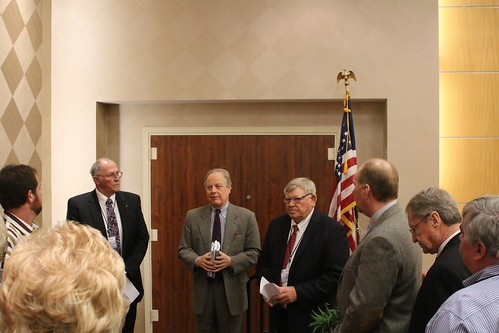Congressional tour . . . .
Posted on Apr 14, 2014Kentucky’s eight members of Congress had plenty on their minds as they spoke to the KFB contingent -- both as a group at the traditional breakfast and in ensuing breakout meetings with constituents. Their topics included immigration reform, foreign trade, the estate tax, health care, energy policy, environmental regulations, Country-of-Origin labeling, banking, industrial hemp, the federal budget, political discourse and, of course, the farm bill.
The Congressional Tour agenda also involved briefing sessions, tours to popular sites and visits to legislative offices on Capitol Hill. As is the tradition, the concluding event was a question-and-answer session with Senators Mitch McConnell and Rand Paul.
Following are capsules from the comments made by the lawmakers at the breakfast meeting:
Senator Mitch McConnell

The Senate Minority Leader explained several farm bill battles that he waged on behalf of Kentucky agriculture. The most highly-publicized was an amendment to allow for pilot projects in producing industrial hemp. This already has led to an initiative among the Kentucky Department of Agriculture and the University of Kentucky College of Agriculture, Food and Environment, McConnell explained.
He then mentioned how he and other tobacco-state members defeated an effort to exclude tobacco from the farm bill, plus worked to resolve a dispute over this year’s tobacco buyout program payment, which USDA was seeking to reduce under the sequestration law applied to other programs.
The senior senator expressed frustration over failure to get the Obama administration to grant Trade Promotion Authority that could lead to lead to export growth for Kentucky products.
“We’ve got a serious jobless problem and virtually everything they (the administration) do is making it worse,” McConnell said. “We’ve had a hard time getting this administration to do something for jobs.”
He affirmed continuing support for abolishing the estate tax. Before concluding, McConnell noted that he has served on the Agriculture Committee throughout his many years of service in the Senate.
Senator Rand Paul
The first-term Republican opened with this: “I’ve got some good news and some bad news for you. The good news is the government is open. The bad news is the government is open, borrowing $1 million per minute.”

The bulk of Paul’s remarks were centered on stories illustrating government overreach, particularly within USDA and EPA. After relating how a Missouri rabbit producer had been required to get a permit for a natural disaster evacuation plan for the animals, Paul said: “We’ve let things get out of hand.’
In regard to the Clean Water Act, he said: “We now interpret dirt to be a pollutant and your backyard as a wetland.”
He had the audience’s full attention with stories of a heavy-handed government and bizarre regulatory requirements, including one report about some elderly Mississippi residents who received jail sentences for violations of a quirky environmental law.
“The whole idea of our Constitution was to restrain government, not restrain you,” he said.
He vowed to continue the battle against big government.
Congressman Hal Rogers
The Chairman of the House Appropriations Committee attended the event for the 34th time. He began by expressing his pride that KFB President Mark Haney also hails from Pulaski County. “He is highly respected and well liked at home,” Rogers told the group.
“I hope you breathed a sigh of relief when we finished that farm bill,” he continued. “The most important thing is you have a five-year bill.”
The Somerset Republican bemoaned the impact that entitlement program spending is having on the federal deficit. “When I came here 34 years ago entitlements were only one-third of the (federal) spending. Now it’s a complete turnaround - - we only appropriate one-third of the budget and entitlements are the rest. We’ve cut $200 billion out of federal spending in the past 3 /12 years -- the biggest cuts since the Korean War - -and it’s still not enough. Congress needs to get the spine to tackle this,” he said.
He drew laughter when informing the group that he had a budget meeting that morning and “the first speaker is the IRS Commissioner; I can’t wait to get there.”
Rogers also blasted the EPA, calling the agency “brazen” and “out of control.” He noted that his committee had dramatically reduced the EPA’s budget in recent years.
Congressman Ed Whitfield
The 1st District Republican serves on the Energy Committee and devoted most of his time to related issues, especially the Obama administration’s positions on coal and climate change. He criticized the administration for “taking an alarmist approach” on climate change. He pointed to a comment from Secretary of State John Kerry, who said during a speech in Indonesia that “climate change can now be classified as a weapon of mass destruction.”
“That’s a disservice,” Whitfield said of Kerry’s remark.

He noted that a Wall Street Journal poll asking respondents to rank 15 issues in order of importance had jobs at number one and climate change at number 15.
Whitfield said Kentucky’s coal industry is fading fast under the Obama administration.
“We can’t build a coal-powered plant in America right now because of their regulations,” he said. “This administration also has placed pressure on the international banking community to refrain from financing coal-powered plants.”
He stressed that the coal issue could impact all Kentuckians in the form of higher electricity costs. The effect would be most damaging to farmers and small businesses that operate on a thin margin.
Congressman John Yarmuth
The Louisville Democrat said he was miffed about the “spin” war surrounding issues like the Affordable Care Act and the minimum wage. After mentioning that he is a former journalist, Yarmuth expressed his concern about the political discourse emerging from national politics.

“I’m really, really alarmed about the way we discuss politics in this country,” Yarmuth said. “We play into the media to deliberately spin; we need to be honest with you when we talk about these issues.”
He said the Affordable Care Act has been vastly mischaracterized through a host of stories “about people disadvantaged by the ACA.” While there are indeed some negatives, a close look into most of the instances cited would reveal a more positive situation than reported, said Yarmuth.
He noted that he is among a small group of House members who have continually worked on the immigration reform issue. The lack of action on the issue has been frustrating, he added.
“There is no organized opposition to immigration reform and we can’t get it done,” he said incredulously. “Why? Well, there is an advocacy industry, and as soon as you veer away, you are under attack.”
Yarmuth finished his remarks with the subject of anti-government sentiments.
“We saw that when the government shut down, people didn’t like that. They want government. So let’s stop bashing the government and figure out how to make it work better.”
Congressman Brett Guthrie
The Bowling Green Republican spoke about the trials and tribulations involved in moving a farm bill through Congress. Of the many delays and conflicts that resulted in a bill that was three years overdue, he said “it wasn’t necessarily partisan; it was the differences between all the groups. A lot of times we get caught between our political means and those groups. “

Guthrie said the experience was valuable in terms of learning about farm policy and farm politics. “It’s difficult. It’s frustrating. But it shows the process can work.”
He added: “I got my instructions from you, and it was how do we handle food stamps – make some reforms - - and then having a strong crop insurance program.”
Most people, he said, would be astounded by the widely diverse number of special interests involved in the farm bill process.
“There were complicated things in the bill that had unintended consequences. There were winners and losers.”
With food stamping spending commanding the majority of the bill’s cost, it’s difficult to make the public understand that the farm bill is really about food security for the nation, Guthrie said.
To underscore his point, Guthrie pointed to the turmoil in the Ukraine.
“The Ukraine – they are big wheat producers. Do you think their wheat market is working today?”
Congressman Thomas Massie
The first-term Republican from Lewis County opened with a joke that drew much laughter. He told about House members having a magnetic card they use for automated voting on the House floor. He said he mistakenly handed it to a waitress as payment for his meal and she returned saying the card was rejected. “I told her I had paid my bill; she said, ‘no sir, this card has $17 trillion on it.’”

Massie, who is known as a fiscal hawk, said the farm bill “was the first bill I’ve ever voted on that actually cuts spending.” He said he is part of a group advocating “the penny plan,” in which if all government programs were cut by one percent each year, there would be a balanced budget in five years.
Massie then explained his support of the Country of Origin labeling provision that is in the farm bill. He said he understood concerns about hikes in food costs, but that “people want to know where their food comes from.”
Cattle producers, he added, should be in favor because without labels lower quality beef could be mixed with higher quality in order to lower the retail cost. That would penalize quality products.
He noted his support for the industrial hemp issue, quipping “think rope, not dope.”
He also was highly critical of EPA, saying the agency “is attacking our way of life in Kentucky.”
Massie also alluded to the disconnection in Washington D.C.
“Part of the dysfunction in Washington D.C. is they just aren’t listening to the people in Kentucky,” he said.
Congressman Andy Barr
The Sixth District Republican began by citing statistics showing agriculture’s importance to his district. Nationally, it ranks 54th among the 435 Congressional Districts in the annual value of farm products sold, he said.

He noted that he had voted in favor of three different versions of a farm bill because he understands the importance of protecting the farm economy. He said he had learned much about farm policy through an agriculture coalition he had formed to advise him. The group has had two meetings. “The best way to learn what to do about policy is to listen to the farmers of Central Kentucky,” he said.
He went on to mention his involvement with resolving a dispute over crop insurance guidelines for tobacco and the tobacco buyout program payments. In the crop insurance dispute, he filed a bill in order to get USDA’s attention to change its policy, he said.
Barr serves on the Financial Services Committee, where he said he has learned that the so-called Dodd-Frank law is forcing rural banks to pull back on farm loans. He called Dodd-Frank “disastrous” legislation.
He informed the group that he has assumed the chairmanship of the House “horse caucus.”
Tagged Post Topics Include: Affordable Care Act, Andy Barr, Bowling Green, Brett Guthrie, Capitol Hill, Country Origin of Labeling, Ed Whitfield, EPA, Farm Bill, Financial Services Committee, Hal Rogers, John Kerry, John Yarmuth, Louisville, Mitch McConnell, Pulaski County, Rand Paul, Secretary of State, Somerset, Thomas Massie, Ukraine, Wall Street Journal
Comments